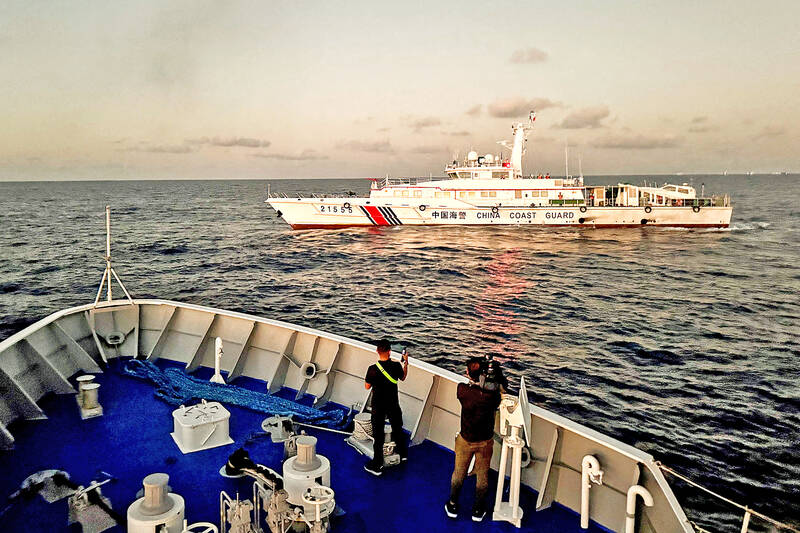New China Coast Guard rules yesterday took effect, allowing it to detain foreigners for trespassing in the disputed South China Sea, where neighbors and the G7 have accused Beijing of intimidation and coercion.
Beijing claims almost the entirety of the South China Sea, brushing aside competing claims from nations, including Taiwan and the Philippines, and an international ruling that its stance has no legal basis.
China deploys coast guard vessels and other boats to patrol the waters and has turned several reefs into militarized artificial islands. Chinese and Philippine vessels have had a series of confrontations in disputed areas.

Photo: Reuters
From yesterday, the China Coast Guard can detain foreigners “suspected of violating management of border entry and exit,” according to the new regulations published online.
Detention is allowed for up to 60 days in “complicated cases,” they say, adding that “foreign ships that have illegally entered China’s territorial waters and the adjacent waters may be detained.”
Manila has accused the Chinese coast guard of “barbaric and inhumane behavior” against Philippine vessels, and Philippine President Ferdinand Marcos last month called the new rules a “very worrisome” escalation.
On Friday, Armed Forces of the Philippines Chief of Staff General Romeo Brawner told reporters that authorities in Manila were “discussing a number of steps to be undertaken in order for us to protect our fishermen.”
Philippine fishers were told “not to be afraid, but just to go ahead with their normal activities to fish there in our exclusive economic zone,” Brawner said.
The G7 criticized what it called “dangerous” incursions by China in the waterway.
“We oppose China’s militarization, and coercive and intimidation activities in the South China Sea,” read a G7 statement at the end of a summit on Friday.
The Philippine Department of Foreign Affairs yesterday said that it has asked the UN Commission on the Limits of the Continental Shelf to formally recognize the extent of its undersea shelf in the South China Sea, off western Palawan province, after more than a decade and a half of scientific research.
The undersea region where the Philippines seeks to formally establish its sovereign rights under the UN Convention on the Law of the Sea (UNCLOS) covers the Spratly Islands (Nansha Islands, 南沙群島), a chain of islands, islets, reefs and atolls that has been fiercely contested over the years by Taiwan, the Philippines, China, Vietnam, Malaysia and Brunei.
“Incidents in the waters tend to overshadow the importance of what lies beneath,” Philippine Ministry of Foreign Affairs Assistant Secretary Marshall Louis Alferez said. “The seabed and the subsoil extending from our archipelago up to the maximum extent allowed by UNCLOS hold significant potential resources that will benefit our nation and our people for generations to come.”
“Today, we secure our future by making a manifestation of our exclusive right to explore and exploit natural resources in our extended continental shelf entitlement,” Alferez said.
Additional reporting by AP

A magnitude 7.0 earthquake struck off Yilan at 11:05pm yesterday, the Central Weather Administration (CWA) said. The epicenter was located at sea, about 32.3km east of Yilan County Hall, at a depth of 72.8km, CWA data showed There were no immediate reports of damage. The intensity of the quake, which gauges the actual effect of a seismic event, measured 4 in Yilan County area on Taiwan’s seven-tier intensity scale, the data showed. It measured 4 in other parts of eastern, northern and central Taiwan as well as Tainan, and 3 in Kaohsiung and Pingtung County, and 2 in Lienchiang and Penghu counties and 1

FOREIGN INTERFERENCE: Beijing would likely intensify public opinion warfare in next year’s local elections to prevent Lai from getting re-elected, the ‘Yomiuri Shimbun’ said Internal documents from a Chinese artificial intelligence (AI) company indicated that China has been using the technology to intervene in foreign elections, including propaganda targeting Taiwan’s local elections next year and presidential elections in 2028, a Japanese newspaper reported yesterday. The Institute of National Security of Vanderbilt University obtained nearly 400 pages of documents from GoLaxy, a company with ties to the Chinese government, and found evidence that it had apparently deployed sophisticated, AI-driven propaganda campaigns in Hong Kong and Taiwan to shape public opinion, the Yomiuri Shimbun reported. GoLaxy provides insights, situation analysis and public opinion-shaping technology by conducting network surveillance

Taiwan is gearing up to celebrate the New Year at events across the country, headlined by the annual countdown and Taipei 101 fireworks display at midnight. Many of the events are to be livesteamed online. See below for lineups and links: Taipei Taipei’s New Year’s Party 2026 is to begin at 7pm and run until 1am, with the theme “Sailing to the Future.” South Korean girl group KARA is headlining the concert at Taipei City Hall Plaza, with additional performances by Amber An (安心亞), Nick Chou (周湯豪), hip-hop trio Nine One One (玖壹壹), Bii (畢書盡), girl group Genblue (幻藍小熊) and more. The festivities are to

AFTERMATH: The Taipei City Government said it received 39 minor incident reports including gas leaks, water leaks and outages, and a damaged traffic signal A magnitude 7.0 earthquake struck off Taiwan’s northeastern coast late on Saturday, producing only two major aftershocks as of yesterday noon, the Central Weather Administration (CWA) said. The limited aftershocks contrast with last year’s major earthquake in Hualien County, as Saturday’s earthquake occurred at a greater depth in a subduction zone. Saturday’s earthquake struck at 11:05pm, with its hypocenter about 32.3km east of Yilan County Hall, at a depth of 72.8km. Shaking was felt in 17 administrative regions north of Tainan and in eastern Taiwan, reaching intensity level 4 on Taiwan’s seven-tier seismic scale, the CWA said. In Hualien, the